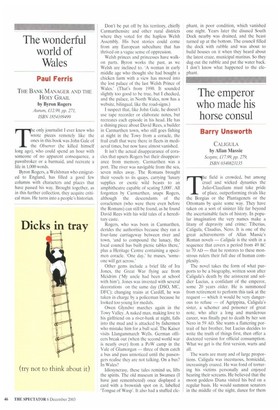The wonderful world of Wales
Paul Ferris
THE BANK MANAGER AND THE HOLY GRAIL by Byron Rogers Aurum, £12.99. pp. 271, ISBN 1854109499 The only journalist I ever knew who wrote pieces remotely like the ones in this book was John Gale of the Observer (he killed himself long ago), who could spend an hour with someone of no apparent consequence, a pawnbroker or a barmaid, and recreate a life in 1,000 words,
Byron Rogers, a Welshman who emigrated to England, has filled a good few columns with characters and places that have passed his way. Brought together, as in this further collection, they acquire critical mass. He turns into a people's historian. Don't be put off by his territory, chiefly Carmarthensire and other rural districts where they voted for the hapless Welsh Assembly. His best stories could come from any European subculture that has thrived on a vague sense of oppression.
Welsh princes and princesses have walkon parts. Byron works the past, as we Welsh are inclined to. 'A woman in early middle age who thought she had bought a chicken farm with a view has moved into the lost palace of the last Welsh Prince of Wales.' (That's from 1990. It sounded slightly too good to be true, but! checked, and the palace, in North Wales, now has a website, bilingual, like the road-signs.)
I suspect that, like John Gale, he doesn't use tape recorder or elaborate notes, but recreates each episode in his head. He has a shining piece about David Rees, a builder in Carmarthen town, who still goes fishing at night in the Towy from a coracle, the frail craft that were there in fleets in mediaeval times, but now have almost vanished.
It isn't the actual disappearance of coracles that upsets Rogers but their disappearance from memory. Carmarthen was a port. The river was navigable from the sea, seven miles away. The Romans brought their vessels to its quays, carrying 'luxury supplies or exotic wild beasts to an amphitheatre capable of seating 5,000'. All forgotten by Carmarthen, snaps Rogers, although the descendants of the coraclemen (who were there even before the Romans) can still be found, as he found David Rees with his wild tales of a hereditary caste.
Rogers, who was born in Carmarthen, derides the authorities because they ran a four-lane carriageway between river and town, 'and to compound the lunacy, the local council has built picnic tables there,' plus a Heritage Centre containing a specimen coracle. 'One day,' he muses, 'someone will get across.'
Other gems include a brief life of Ira Jones, the Great War flying ace from Meidrim (`My uncle had been at school with him'). Jones was invested with several decorations on the same day (DSO, MC, DFC); changing trains at Cardiff, he was taken in charge by a policeman because he looked too young for medals.
Owen Glyndwr marches again in the Towy Valley. A naked man, making love to his girlfriend on a river-bank at night, falls into the mud and is attacked by fishermen who mistake him for a bull seal. The Kaiser visits Llangammarch Wells. German officers break out (when the second world war is nearly over) from a PoW camp in the Vale of Glamorgan — three of them catch a bus and pass unnoticed until the passengers realise they are not talking. On a bus? In Wales?
Idiosyncrasy, these tales remind us, lifts the spirits. The old museum in Swansea (I have just remembered) once displayed a card with a brownish spot on it, labelled 'Tongue of Wasp'. It also had a stuffed ele
phant, in poor condition, which vanished one night. Years later the disused South Dock nearby was drained, and the beast turned up at the bottom. The council filled the dock with rubble and was about to build houses on it when they heard about the latest craze, municipal marinas. So they dug out the rubble and put the water back. I don't know what happened to the elephant.


























































































 Previous page
Previous page